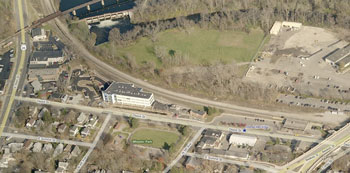Burrowing Under Railroad Berm: Feasible?
On Wednesday, Ann Arbor city staff led a tour of property starting from the city-owned 721 N. Main site, northwards to the entrance ramp of M-14. On the tour were some members of a recently established North Main-Huron River corridor task force.

View of Depot Street from the south. The railroad track curves northward as it passes by Argo Dam, visible at the top of this image.
They were briefed on the status of the 721 N. Main property’s status with respect to potential environmental contamination – which is apparently less certain than what’s been portrayed recently by elected officials.
Task force members were also briefed on a related project that’s in its initial stages: a feasibility study for opening up the railroad berm separating the area south of Depot Street (including 721 N. Main) from the Huron River. The railroad tracks run along the top of the berm. The idea is to study the possible impact of replacing the solid berm – which acts as a dam for stormwater flow from the Allen Creek creekshed – with a culvert or a trestled system for suspending the tracks.
The primary impetus behind the berm project is stormwater management and flood mitigation. That’s reflected by the fact that the source of funds for the roughly $50,000 feasibility study would be from the city’s stormwater utility. The feasibility study would move ahead only if it’s approved by the city council, which will likely have the item on its agenda in about two months.
But the railroad berm study also has implications for pedestrian connections and riverside access – which the task force is supposed to study. The task force is asked to create a vision that, among other things, improves pedestrian and bicycle connections to Bandemer Park and increases public access to riverside parks.
So the railroad berm feasibility study has been coordinated with the goal of pedestrian accessibility. The RFP (request for proposals) for the study includes among its tasks a study of the potential for non-motorized access through the railroad berm.
The problematic character of pedestrian movement on the North Main corridor was evident during the July 25 tour. As the tour group made its way northward toward the M-14 entrance ramp, it repeated a pattern of fracturing into smaller clusters and re-grouping. That was partly a function of the size of the group (about 10 people), but also the corridor itself.
The relatively narrow walkable space – between the road to the left, and fences, buildings or vegetation on the right – features sidewalk slabs in need of repair and sections of dirt path that require single-file passage. Noise from rush hour traffic made conversation difficult along the way.
A year from now, on July 31, 2013, the task force is supposed to deliver its report on a vision for the corridor. Earlier than that, by the end of 2012, the task force has been asked to provide a recommendation on the use of 721 N. Main.
For task force members and members of the public, the same tour will be repeated on Aug. 1, starting at 5 p.m. from 721 N. Main. [Full Story]



